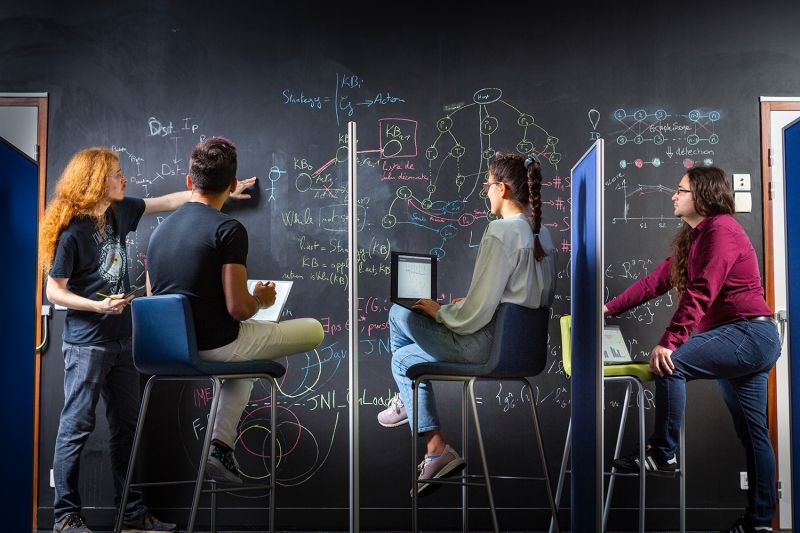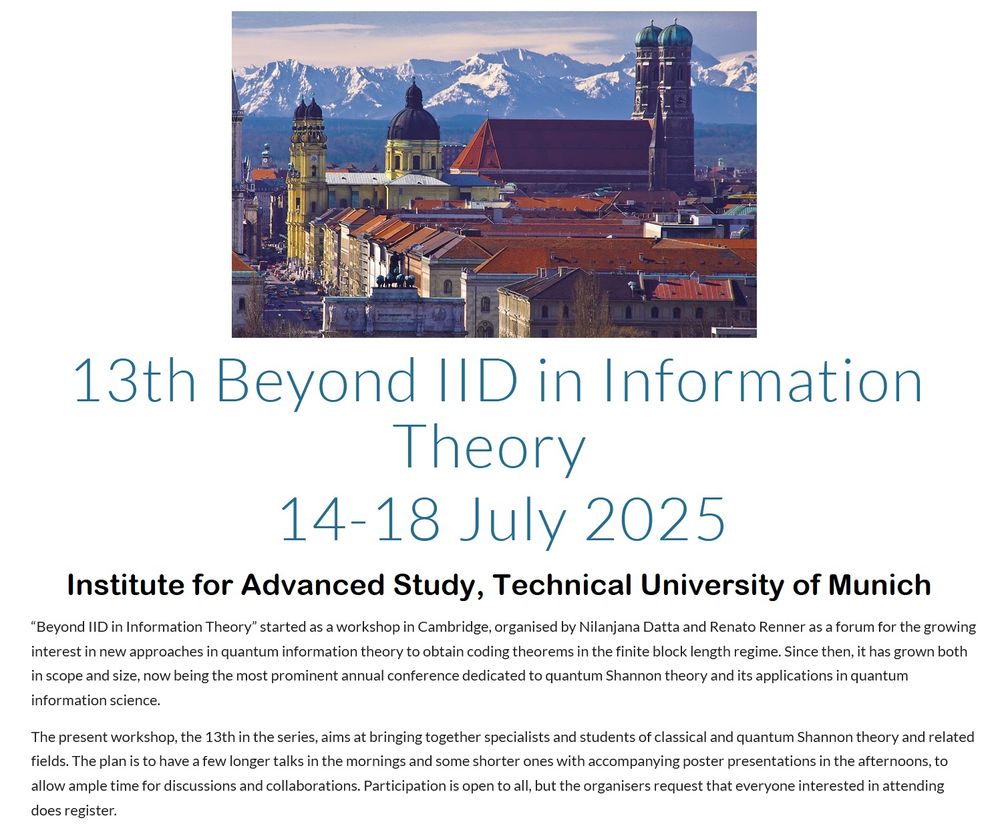
New preprint on Hamiltonian Learning of Coulomb potentials and smooth potentials in continuous space
arxiv.org/abs/2510.08471
Thanks to my collaborators, @hippoquantus.bsky.social , Tim Möbus, and Oliver Siebert!
@hippoquantus.bsky.social
Researcher in quantum information theory at LIG, Grenoble (France)

New preprint on Hamiltonian Learning of Coulomb potentials and smooth potentials in continuous space
arxiv.org/abs/2510.08471
Thanks to my collaborators, @hippoquantus.bsky.social , Tim Möbus, and Oliver Siebert!
A big thanks to my coauthors for the great collaboration! Hopefully you enjoy reading the paper as much as we did writing it, despite the approaching QIP deadline :)
15.09.2025 11:49 — 👍 1 🔁 0 💬 0 📌 0Again, this result generalizes to k-local Hamiltonians for k>2. While the algorithm is sample- and time-efficient, we don't know if it is optimal, because we lack matching lower bounds so far. So we ask: What is the optimal sample-complexity of
certifying Ising Gibbs states?

In our final result, we give an algorithm for certifying Ising Gibbs
states in trace norm that is both sample and time-efficient, thereby solving a question posed by Anshu hdsr.mitpress.mit.edu/pub/3x2sd8nq...
This one actually generalizes to k-local and does not need any additional assumptions (e.g. on the degree of the interaction graph). Whether one can find a better algorithm that is also time efficient is an interesting open problem.
15.09.2025 11:42 — 👍 1 🔁 0 💬 1 📌 0Secondly, we design an algorithm for learning Ising Gibbs states in trace norm that is sample-efficient in all parameters. Previous approaches learned the underlying Hamiltonian (which implies learning the Gibbs state) but suffered from exponential sample complexity in the inverse temperature.
15.09.2025 11:38 — 👍 1 🔁 0 💬 1 📌 0To our knowledge, this is the first nearly-optimal algorithm for testing a Hamiltonian property. A key ingredient in our analysis is the Bonami Lemma from Fourier analysis. Curiously, this Lemma is the reason that our results do not seem to easily generalize to k-local Hamiltonians for k>2.
15.09.2025 11:36 — 👍 1 🔁 0 💬 1 📌 0First, we show that certifying an Ising Hamiltonian (checking whether it is identical to some H_0 or far from it) in
normalized Frobenius norm via access to its time-evolution operator requires only O(1/ε) evolution time. This matches the known lower bounds up to a logarithmic factor.

Happy to announce our new paper "Certifying and learning quantum Ising Hamiltonians" scirate.com/arxiv/2509.1..., together with Matthias C. Caro, Francisco Escudero Gutiérrez, Aadil Oufkir, and Cambyse Rouzé. We are focusing in this paper on 2-local Hamiltonians (so a bit more general than Ising).
15.09.2025 11:30 — 👍 14 🔁 0 💬 1 📌 0
The QIP 2026 call for papers is out! QIP 2026 will be held in Riga, Latvia from January 24–30, 2026. See you there!
qip2026.lu.lv
I am currently looking for a PhD student who would like to work on position-based cryptography. Details can be found here: andreasbluhm.eu/wp-content/u...
Please spread the word!
Thanks to Tim Möbus, Tuvia Gefen, Yu Tong, Albert H. Werner and Cambyse Rouzé for the great collaboration!
03.06.2025 09:23 — 👍 0 🔁 0 💬 0 📌 0Our main technical tool is a new adiabatic approximation for general Lindbladian evolutions with unbounded generators which should also be helpful elsewhere. For example, we can quantify with it how photon-driven dissipation leads to an effective evolution on the code space for bosonic cat codes.
03.06.2025 09:21 — 👍 1 🔁 0 💬 1 📌 0
Before, we could either do Heisenberg-limited learning for Bose-Hubbard type models scirate.com/arxiv/2307.0..., or learn arbitrary Hamiltonians with engineered dissipation, but not with Heisenberg scaling scirate.com/arxiv/2307.1.... Our new paper shows that you can have the best of both worlds.
03.06.2025 09:14 — 👍 0 🔁 0 💬 1 📌 0
New day, new paper, this time on Heisenberg-limited Hamiltonian learning for continuous variable systems with engineered dissipation: scirate.com/arxiv/2506.0.... The idea is to use strong dissipation to restrict the Hamiltonian evolution onto a convenient subspace where we can learn it.
03.06.2025 09:10 — 👍 7 🔁 0 💬 1 📌 0Thanks to my PhD student Simon Höfer, Alex May, Mikka Stasiuk, Philip Verduyn Lunel and @henryyuen.bsky.social for the great collaboration! And congratulations to Simon for his first paper.
02.06.2025 09:23 — 👍 3 🔁 0 💬 0 📌 0In the longer term, our aim is to be able to put NLQC tasks into classes of equally hard problems, like complexity classes. This would allow us to identify the hard NLQC problems that we would like to use for quantum position verification, because they are hard for attackers to solve.
02.06.2025 09:21 — 👍 2 🔁 0 💬 1 📌 0In particular, we have shown that two protocols for quantum position verification, the f-route and the f-measure protocol, are equally secure, i.e., if you can attack one, you can attack the other. This gives the first subexponential upper bound on the entanglement needed to attack f-measure.
02.06.2025 09:17 — 👍 2 🔁 0 💬 1 📌 0
We have a new preprint out on the topic of quantum position verification and non-local quantum computation (NLQC): scirate.com/arxiv/2505.2.... We are comparing different NLQC tasks and find reductions between them (in the sense of if I can do task 1, then I can do task 2 with an extra EPR pair).
02.06.2025 09:15 — 👍 7 🔁 1 💬 1 📌 1
CNRS is opening a call for CPJ (chair de professeur junior), a kind of tenure track with very good conditions. One position is open for quantum computing, and one of the hosting labs is LIG in beautiful Grenoble! The application deadline is July 14th.
www.ins2i.cnrs.fr/fr/cnrsinfo/...
Thanks to my coauthors for the great collaboration!
29.04.2025 09:20 — 👍 0 🔁 0 💬 0 📌 0To unite these different phenomena, we consider multimeters, i.e., collections of measurements. Many of them, e.g., compatible measurements, classical simulations of measurements, or the compression of measurements can be viewed as factorizations of these multimeters through different state spaces.
29.04.2025 09:18 — 👍 0 🔁 0 💬 1 📌 0
If you are interested in quantum non-classicality, you might enjoy our new preprint: scirate.com/arxiv/2504.1.... In it, we use the framework of general probabilistic theories to connect different forms of non-classicality, in particular measurement incompatibility, steering, and Bell non-locality.
29.04.2025 09:14 — 👍 6 🔁 0 💬 1 📌 0FZ Jülich is hiring a PhD candidate which will be co-supervised by myself at U Cologne. Interested in benchmarking/characterisation, in working in a highly collaborative environment, and want to see your work being used in experiments? Consider applying!
www.fz-juelich.de/en/careers/j...

If you're an undergraduate student interested in the mathematics of quantum physics and general relativity, consider the
Tübingen International M.Sc. Program in #MathematicalPhysics
www.math.uni-tuebingen.de/en/mmp
Opens for applications today
Summer school Mathematics and Physics of Quantum Computing and Quantum Learning, on the island of Porquerolles, France
www.quantiki.org/conference/m...
PhD Opportunities – Quantum Algorithms for Quantum Chemistry. Join the Quantum for Life Center at the University of Copenhagen as PhD student! Work on quantum algorithms for chemistry with Prof. Matthias Christandl & co-supervision by Prof. Markus Reiher (ETH Zurich). 1/n
25.02.2025 11:15 — 👍 3 🔁 3 💬 1 📌 1
⏰ Beyond IID 2025 Conference just announced
sites.google.com/view/beyondi...
We're looking for a new addition to our group. Drop me a message if you're interested!
13.02.2025 15:58 — 👍 8 🔁 3 💬 0 📌 0